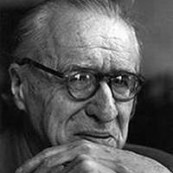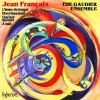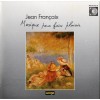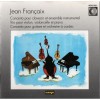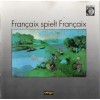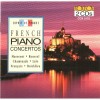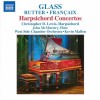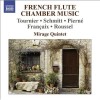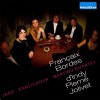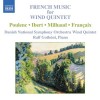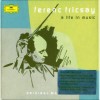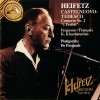Composers
Jean René Désiré Françaix (23 May 1912 in Le Mans – 25 September 1997 in Paris) was a French neoclassical composer, pianist, and orchestrator, known for his prolific output and vibrant style.
Françaix's natural gifts were encouraged from an early age by his family: his father, Director of the Conservatoire of Le Mans, was a musicologist, composer, and pianist, and his mother, a teacher of singing. He was only six when he took up composing, and his first publication, in 1922, caught the attention of a composer working for the publishing house who steered the gifted boy toward a gifted teacher, Nadia Boulanger. She encouraged Françaix's career, considering the young composer to be one of the best, if not the best, of her students. Noted pianist and pedagogue Isidor Philipp also taught him. Françaix himself often played his own works, to public acclaim; notably in the premier of his Concertino for Piano and Orchestra at the festival of Baden-Baden in 1932.
He was an accomplished pianist from an early age, earning a First Prize in Piano at the Paris Conservatory (his only formal musical qualification) and was sought after for accompanying as well as solo performances. He performed notably in a duo with the French cellist Maurice Gendron, and also performed the Poulenc Two Piano Concerto with Francis Poulenc for several engagements when Jacques Février was not available. His own Two Piano Concerto was written however for his daughters, both of whom were budding young pianists at the time of the composition.
Jean Françaix's primary occupation was his extraordinarily active compositional career. He remained prolific throughout his life; even in 1981 he described himself as "constantly composing", barely finishing one piece before beginning another, and continued thus until his death in 1997.
Maurice Ravel said of the young Françaix to the boy's parents, "Among the child's gifts I observe above all the most fruitful an artist can possess, that of curiosity: you must not stifle these precious gifts now or ever, or risk letting this young sensibility wither." They did not, and he flourished: Françaix was a prolific composer, writing over 200 pieces in a wide variety of styles.
Since he was a virtuoso pianist, many of his works feature the piano, particularly his numerous chamber works which he wrote for nearly every orchestral instrument and standard ensemble. He was a skilled orchestrator, which was reflected in his use of tone colors. Françaix wrote pieces in many of the major large musical forms, including concerti, symphonies, opera, theatre, ballet, and works drawing on traditions falling out of favor in the 20th century, such as the cantata. Though he often put his own modern spin on the old modes of expression, he was an avowed neoclassicist who rejected atonality and formless wanderings, and he drew from great literature of the past for his vocal settings. He also wrote ten film scores for director Sacha Guitry.
Françaix's style is marked by lightness and wit (a stated goal of his was to "give pleasure"), as well as a conversational style of interplay between the musical lines. It changed little throughout his career; while he was influenced by composers he admired (such as Emmanuel Chabrier, Igor Stravinsky, Maurice Ravel, and Francis Poulenc), he integrated what he picked up into his own distinct aesthetic, which was already evident in his early works.
Recently Added
Biography
Jean René Désiré Françaix (23 May 1912 in Le Mans – 25 September 1997 in Paris) was a French neoclassical composer, pianist, and orchestrator, known for his prolific output and vibrant style.
Françaix's natural gifts were encouraged from an early age by his family: his father, Director of the Conservatoire of Le Mans, was a musicologist, composer, and pianist, and his mother, a teacher of singing. He was only six when he took up composing, and his first publication, in 1922, caught the attention of a composer working for the publishing house who steered the gifted boy toward a gifted teacher, Nadia Boulanger. She encouraged Françaix's career, considering the young composer to be one of the best, if not the best, of her students. Noted pianist and pedagogue Isidor Philipp also taught him. Françaix himself often played his own works, to public acclaim; notably in the premier of his Concertino for Piano and Orchestra at the festival of Baden-Baden in 1932.
He was an accomplished pianist from an early age, earning a First Prize in Piano at the Paris Conservatory (his only formal musical qualification) and was sought after for accompanying as well as solo performances. He performed notably in a duo with the French cellist Maurice Gendron, and also performed the Poulenc Two Piano Concerto with Francis Poulenc for several engagements when Jacques Février was not available. His own Two Piano Concerto was written however for his daughters, both of whom were budding young pianists at the time of the composition.
Jean Françaix's primary occupation was his extraordinarily active compositional career. He remained prolific throughout his life; even in 1981 he described himself as "constantly composing", barely finishing one piece before beginning another, and continued thus until his death in 1997.
Maurice Ravel said of the young Françaix to the boy's parents, "Among the child's gifts I observe above all the most fruitful an artist can possess, that of curiosity: you must not stifle these precious gifts now or ever, or risk letting this young sensibility wither." They did not, and he flourished: Françaix was a prolific composer, writing over 200 pieces in a wide variety of styles.
Since he was a virtuoso pianist, many of his works feature the piano, particularly his numerous chamber works which he wrote for nearly every orchestral instrument and standard ensemble. He was a skilled orchestrator, which was reflected in his use of tone colors. Françaix wrote pieces in many of the major large musical forms, including concerti, symphonies, opera, theatre, ballet, and works drawing on traditions falling out of favor in the 20th century, such as the cantata. Though he often put his own modern spin on the old modes of expression, he was an avowed neoclassicist who rejected atonality and formless wanderings, and he drew from great literature of the past for his vocal settings. He also wrote ten film scores for director Sacha Guitry.
Françaix's style is marked by lightness and wit (a stated goal of his was to "give pleasure"), as well as a conversational style of interplay between the musical lines. It changed little throughout his career; while he was influenced by composers he admired (such as Emmanuel Chabrier, Igor Stravinsky, Maurice Ravel, and Francis Poulenc), he integrated what he picked up into his own distinct aesthetic, which was already evident in his early works.
